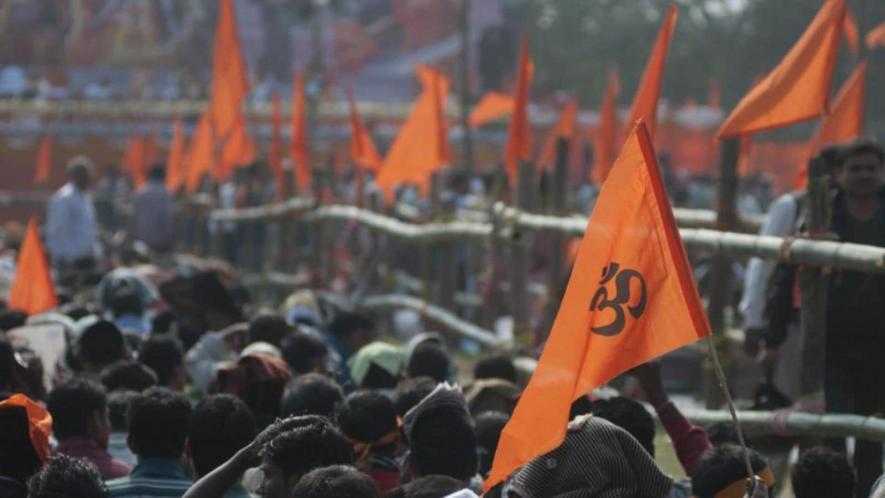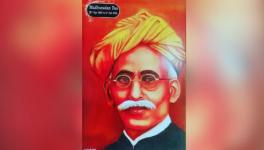Resisting Corporate Hindutva: Impact of Livelihood Issues on Recent Elections

Image for representational purpose.
The victory of a Dalit candidate in an open parliamentary constituency election is a rare occurrence in India, especially in the heartland of our country, the bastion of Hindutva forces and a breeding ground for caste politics. Voters of Faizabad constituency defied expectations by electing a Dalit candidate from the Samajwadi Party from a general seat in Uttar Pradesh, a state infamous for its Chief Minister and his bulldozer politics.
The Ram temple and Ayodhya was a strategic point in the Bharatiya Janata Party’s (BJP) election campaign to help them achieve their highly propagated (to create an illusion) goal of 400 plus seats in Parliament, riding their master tactic of using religion as a weapon to communalise people’s emotions.
It will be too much say that people voted against Hindutva optics, as primarily they voted on the issues of livelihood. While BJP likely hoped to capitalise on Hindutva sentiments surrounding the Ram temple, voters appeared to be more concerned with pressing economic issues.
The main cause for people’s anger in Faizabad was partial or complete demolition of nearly 4,000 homes and shops nearly 40,000 people without proper compensation. These policies disproportionately impacted tenants, lower income groups, Dalits and minorities who bore the brunt of the hardships.
The recent election results suggest that issues related to the common people, particularly economic livelihood concerns, health, education and social security motivated citizens to vote against BJP. While this example alone does not establish a trend for the recent general elections, it is evident that the common people's 10-year experience under BJP rule has led them to prioritise issues related to livelihood over religious sentiments. The people of India have given their mandate to deprive the BJP of the majority it had secured in the past two Lok Sabha elections of 2014 and 2019.
The issues of daily life, including unemployment, rising prices, economic hardship, farmers' dissatisfaction, workers plight and youth protests against the Agniveer (armed forces recruitment) scheme, clearly dominated the electoral narrative, relegating the BJP’s hard-core Hindutva agenda to the background.
The working class, peasantry and rural proletariat took the challenge of defeating BJP. It becomes more evident when one sees the defeat of BJP in 159 predominantly rural constituencies in the country where people voted for change.
People in rural India have experienced ongoing distress due to the lack of a remunerative Minimum Support Price (MSP) for crops and stagnating real wages during the Narendra Modi regime’s decade, making their lives more uncertain and difficult.
The BJP's election campaign, funded by substantial amounts of money collected through illegal electoral bonds that are symbols of the corporate-political nexus, portrayed a completely different picture to the people.
There was an effort, especially after the second phase of polling, to create an environment of communal polarisation so that people are forced to prioritise their religious sentiments and ignore their day-to-day life experiences. Unknown enemies were created using religious, casteist, and even geographical identities.
The entire campaign, led by the Prime Minister himself, stooped to new lows in politics, even maligning the office of the Prime Minister. However, in reality, people were struggling to survive. The cost of living, healthcare, education, basic needs, and even the average cost of a single meal had increased significantly, while their real wages were shrinking.
The insufficient budgetary allocation has been denying millions of MGNREGA (rural job guarantee scheme) workers in rural India their right to work. The Modi regime further weakened the programme through inadequate funding, low wage rates, undermining social audit infrastructure, and discouraging both workers and local officials of MGNREGA.
Most importantly, the recent changes made in the online attendance system, caste-wise fund allocation and ABPS (Aadhaar-based Payment System) wage disbursement have been particularly detrimental.
The impact of these policies can be seen in the words of an MGNREGA woman worker from Partur taluka, Jalna district, Maharashtra told this writer. “When I work under MGNREGA, I feel safer, have self-respect and dignity than when I work as an agricultural labourer on farmland, where I feel disrespected, ostracised and subordinated due to feudal relations”. She said she was determined to resist attacks on MGNREGA by voting against the BJP.
If we analyse the loss of BJP and the victory of the Opposition INDIA bloc candidates, considering both their campaign processes and party structures, it becomes clear that it is these voters who denied BJP a majority. For example, the Congress party has a very weak organisational structure in Uttar Pradesh. The campaign also failed to anticipate this outcome. Additionally, Congress was not seen actively fighting for people’s concerns or challenging the authoritarian State. While the Samajwadi Party campaigned on livelihood issues, a joint effort to manage all polling booths proved unsuccessful.
A similar situation unfolded in Haryana, where visible leadership conflicts within Congress hampered their poll campaign. Nevertheless, in all these areas, voters chose candidates against BJP, ultimately benefiting the leading constituents of the INDIA bloc.
In Himachal Pradesh, Congress, running independently, failed to coordinate campaigns with other parties in the alliance. Despite having a state government, Congress suffered a significant loss in all four Lok Sabha seats. The coming together of the Opposition parties on a common platform, the INDIA bloc, was not given much importance. However, even more criminal was the undermining of the impact of people’s struggle.
Before the elections, the corporate media, so-called political analysts, and BJP backed intellectuals created a narrative of Modi’s ‘invincibility’. This was an effort to ignore the defeat of Modi’s policies at the hands of people’s struggles, especially the year-long Kisan Movement against the three farm laws.
The struggles of peasants, the working class, students, youth, wrestlers and other sections of society also instilled confidence in people that BJP can be defeated.
Much has been written by various analysts about the defeat of BJP in 38 seats of Uttar Pradesh, Punjab, Rajasthan and Haryana and Maharashtra. These states have witnessed continuous struggles by the peasantry against BJP policies. In fact, the BJP failed to open its account, and its ally Akali Dal could only manage to win two seats in Punjab, the epicentre of the farmer’s movement.
BJP lost five seats in Haryana and 11 seats in the farm belt of Rajasthan. Peasant leader Amra Ram emerged victorious as a joint candidate of INDIA from Sikar. BJP and its allies suffered heavy losses in the Marathwada region of Maharashtra, where landless workers are fighting to protect the land they have occupied through historic struggles and with great sacrifices.
Such were the attacks on the country’s democratic culture and human rights in the past decade that people came out in defence of the Constitution during elections. The reality is that common people, especially in rural India, have limited understanding of the Constitution. However, it has become a symbol of their rights. For the deprived sections, the Constitution has become a symbol, not only of reservation but also of protection from atrocities.
The open statements by BJP leaders about the need to win 400 seats to change the Constitution strongly impacted the Scheduled castes, tribes and minorities, leading them to become more organised against BJP. In fact, a good share of traditional Bahujan Samaj Party Dalit voters switched their allegiance and voted for Congress in Uttar Pradesh.
Apart from big money use, religious sentiments, the inability of the Election Commission of India to conduct fair elections, and the partisan role of central investigation agencies in favour of BJP, one major concern is the discourse set on the basic rights of citizens.
Basically, most political parties consider voters as beneficiaries and offer various welfare schemes like free healthcare, education, and money transfers to women and other sections of society. However, nobody talks about policies like the public healthcare sector, public education, employment, or the government's responsibility for creating infrastructure for agriculture and industry.
Populist politics has limitations. It takes citizens away from their rights and converts them into beneficiaries attracted to limited-target, non-universal government schemes. While these schemes attract people, they also allow governments and parties to withdraw from their basic duties of providing essential facilities to citizens.
In contrast, people's governments with alternative economic policies to neoliberalism, work to develop and save public education, healthcare, basic services, and protect institutions of social welfare state -- all basic rights of the people. Political parties that attract voters by promising temporary, directly visible benefits that have a limited impact on their lives, ultimately destroy citizens' basic rights. In fact, these parties use these limited beneficiary programmes, like old age pensions, to create a false dichotomy. In Kerala, the state government provides pensions to lakhs of people, not as charity or to gain election benefits, but as a right of the citizens.
This recent election pitted the BJP, its mentor Rashtriya Swayamsevak Sangh or RSS, corporate media, and their class support of corporates, financial capital both national and international against the "INDIA bloc" representing the people of India. There was an impression that despite fear, brave Indians, particularly the working class and peasantry, used their vote to raise their voice.
The anger of these productive classes has stalled the BJP for now. However, the fascistic party is adept at manipulating situations through communal agendas, social engineering, and political manoeuvring. The responsibility, therefore, falls on people's movements to convert this discontent into a strong opposition against the BJP and its allies' policies of economic and social oppression, as well as communal polarisation. This will further empower the people to rise against these anti-people policies and prepare them for the final push against the corporate- Hindutva nexus.
The writer is Joint Secretary, All India Agriculture Workers Union. The views are personal.
Get the latest reports & analysis with people's perspective on Protests, movements & deep analytical videos, discussions of the current affairs in your Telegram app. Subscribe to NewsClick's Telegram channel & get Real-Time updates on stories, as they get published on our website.
























